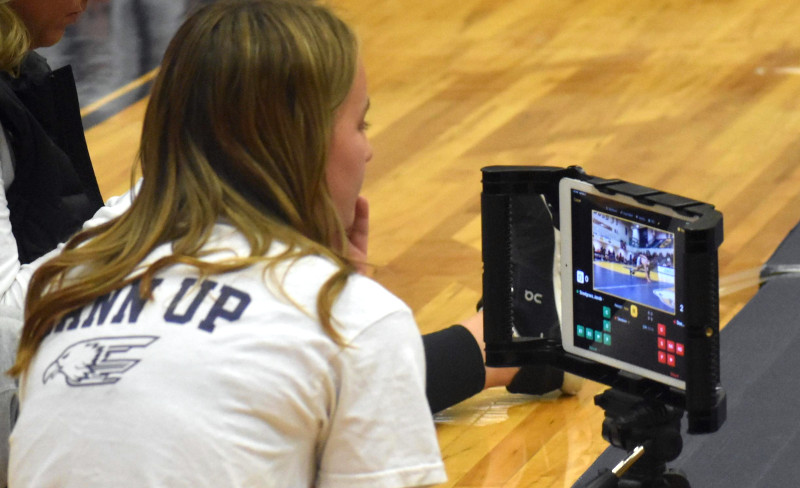By Tru Swoboda
The water bottles are to be filled. The laundry must be washed, dried and hung neatly in the closet by 5:45.
The grocery carts crammed with tennis balls are to be wheeled on to the courts before practice, and the basketball courts must be swept spotless.
The snacks, drinks, and uniforms should be packed and organized before the big away game.
All of these are factors to be considered behind any athletic program at Delta High School. But who is responsible for it all? And no, it isn’t always the coaching staff.
It’s the managers.
“A lot of people assume that being a manager means being involved with the team without any responsibilities,” junior Camden Schwering said. “A lot of the work the managers do goes overlooked I think.”
Schwering served as baseball manager last spring. To some, his job may seem unentertaining. A waste of valuable free time. But to him, managing is much more.

Schwering has grown up around the game of baseball, so when he found out that playing on the team was no longer in the cards for him, he had no doubt that he wanted to continue to stay involved with the team in some way.
”Baseball has always been one of my bigger passions, so when making the team didn’t really work out, managing was the second best option,” Schwering said.
And this is just one of various reasons why managers choose to devote their time to certain athletic programs.
Some manage because they have siblings who are highly involved in a particular sport.
Sophomore Mia Bollinger is a perfect example of this.
Bollinger has been managing the wrestling team since her freshman year, solely because of her brother, junior 113-pounder Ayden Bollinger.
She felt it would be more convenient to just manage the team since she was already attending all of the meets and functions.
And surprisingly enough, there are managers here with only one motive to manage.
Because they simply enjoy it.
Freshman Olivia Orr manages the girls’ basketball team. Why? Because it brings her entertainment and keeps her busy.
She enjoys watching the girls play and progress, as well as traveling with the team.
It’s evident that every manager has a reason for why they do what they do, but this still begs one of the most commonly unanswered questions.
What do managers really do for the team?
As one of the baseball managers, aside from just filling up waters, Schwering is responsible for organizing and setting up equipment before practice, throwing, and setting up drills involving both infield and outfield players.
During the spring season, Schwering works with the baseball team every day after school, usually until 5:45 or 6:00 p.m.
And although staying after school for two or more hours is the average time frame for almost every manager, their schedule, practice procedures, and tasks vary drastically depending on the sport.
For example, each sport holds its own set of rules, regulations and guidelines that must be understood by managers in order to be helpful to the team.
So just as Schwering must know the rules of baseball in order to run drills and throw with players, Bollinger must know the rules of wrestling.
“There are a lot of rules that go into wrestling, and it can be difficult to understand, especially for someone who doesn’t wrestle,” Bollinger said.
Knowing the rules is vital for Bollinger as a manager because one of her most important responsibilities is filming the wrestling matches on Ipads. And on the frequent occasions when the Ipads break, or the battery dies, she must be prepared to use a scorebook to record each detail of the match.

Along with this, Bollinger and the other managers, Grace Jarrells and Nila Johnson, are in charge of washing and drying the wrestlers’ singlets and placing each of them neatly in the wrestlers’ bags the day before each match.
And although these managers appear to be well equipped in these tasks, they claim that there are certain aspects they are less keen on, in comparison to others.
According to Orr, one of these difficult aspects involves a giant plastic tub, full of ice-filled water bottles, and the entirety of the girls’ basketball team jerseys.
“There is this big bucket of all of the team jerseys that we have to take on and off the buses and into the locker rooms for away games,” she said. “It’s a lot heavier than you’d think.”
Orr said that it sometimes takes more than three people to lug the container on and off the buses.
It’s apparent that there are many responsibilities involved in being a sports manager, varying between sports. But this isn’t always acknowledged enough, according to most managers.
Some managers claim there can be certain stereotypes.
“I think there is a common stereotype that we only manage because we weren’t good enough to play,” Schwering said.
Schwering claims he genuinely enjoys managing, and he felt taking this path was a better decision for him.
Along with this, there may also be certain stereotypes that managing is unbeneficial to athletic programs, leading people to believe that managing is bad.
“I think it’s important for people to realize that being a manager shouldn’t be considered a bad thing at all,” Bollinger said. “There is a lot of work, but it helps out the coaches more than people know.”
Aside from the stereotypes, managing can build close relationships, help develop good character, improve time management, and serve as a way to get involved here at Delta.
So maybe there is more to managing than just filling up water bottles.






